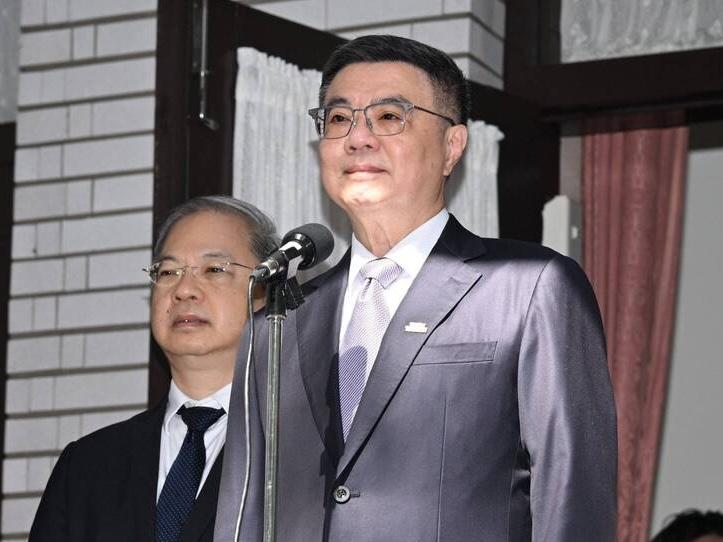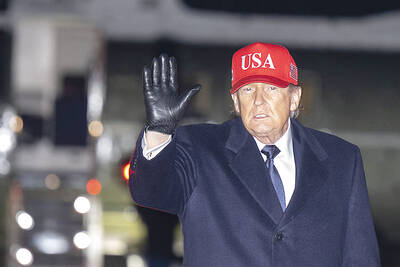The government has prepared a strategic plan and is ready to negotiate with the US on tariffs, Premier Cho Jung-tai (卓榮泰) said today.
The aim for negotiations would be to balance trade, Cho said, adding that he urges the public to have patience while negotiations are ongoing.
Speaking to reporters prior to a Legislative Yuan policy briefing today, Cho said that the world trade order is undergoing a major reorganization in response to US tariff policy, and in response, the government wants to stabilize domestic industries and prepare for negotiations.

Photo: Tien Yu-hua, Taipei Times
Preparations have been made for tariff discussions with the US, including by Vice Premier Cheng Li-chun (鄭麗君), the Office of Trade Negotiations and the national security team, Cho said.
The US Department of Commerce yesterday said it would investigate semiconductor and semiconductor manufacturing equipment imports, along with the pharmaceutical industry, for potential new tariffs.
In response, Minister of Health and Welfare Chiu Tai-yuan (邱泰源) told reporters that the ministry is prepared to respond to either drug price increases or drug shortages to ensure that the public maintains sufficient and safe access to medicines.
Taiwan imports about 10 percent of its drugs from the US, many of which are cancer drugs, Chiu said, adding that the ministry is prepared for the possibility of price increases.
In response to potential semiconductor tariffs, Minister of Economic Affairs J.W. Kuo (郭智輝) said that Taiwan is to simulate potential impacts and seek talks with Washington on the issue.
Also speaking to reporters outside the legislature, Kuo said he would seek to discuss the matter with the US and ensure "fair competition" for Taiwanese industry.
The Taiwanese and US chip sectors are complementary, he added.
"As to how much [the tariffs] could be, we will of course carry out simulations," Kuo said. "On the tariffs issue, we will try as hard as possible to communicate with the US side."
The level of chip tariffs would be "the outcome of talks," he added without elaborating.
Additional reporting by Reuters

Taiwan has received more than US$70 million in royalties as of the end of last year from developing the F-16V jet as countries worldwide purchase or upgrade to this popular model, government and military officials said on Saturday. Taiwan funded the development of the F-16V jet and ended up the sole investor as other countries withdrew from the program. Now the F-16V is increasingly popular and countries must pay Taiwan a percentage in royalties when they purchase new F-16V aircraft or upgrade older F-16 models. The next five years are expected to be the peak for these royalties, with Taiwan potentially earning

STAY IN YOUR LANE: As the US and Israel attack Iran, the ministry has warned China not to overstep by including Taiwanese citizens in its evacuation orders The Ministry of Foreign Affairs (MOFA) yesterday rebuked a statement by China’s embassy in Israel that it would evacuate Taiwanese holders of Chinese travel documents from Israel amid the latter’s escalating conflict with Iran. Tensions have risen across the Middle East in the wake of US and Israeli airstrikes on Iran beginning Saturday. China subsequently issued an evacuation notice for its citizens. In a news release, the Chinese embassy in Israel said holders of “Taiwan compatriot permits (台胞證)” issued to Taiwanese nationals by Chinese authorities for travel to China — could register for evacuation to Egypt. In Taipei, the ministry yesterday said Taiwan

‘LIKE-MINDED PARTNER’: Tako van Popta said it would be inappropriate to delay signing the deal with Taiwan because of China, adding he would promote the issue Canadian senators have stressed Taiwan’s importance for international trade and expressed enthusiasm for ensuring the Taiwan-Canada trade cooperation framework agreement is implemented this year. Representative to Canada Harry Tseng (曾厚仁) in an interview with the Central News Agency (CNA) said he was increasingly uneasy about Ottawa’s delays in signing the agreement, especially as Ottawa has warmed toward Beijing. There are “no negotiations left. Not only [is it] initialed, we have three versions of the text ready: English, French and Mandarin,” Tseng said. “That tells you how close we are to the final signature.” Tseng said that he hoped Canadian Prime Minister Mark Carney

The US’ joint strikes with Israel on Iran dismantled a key pillar of China’s regional strategy, removing an important piece in Beijing’s potential Taiwan Strait scenario, said Zineb Riboua, a senior researcher at the Hudson Institute’s Center for Middle East Peace and Security. In an article titled: “The Iran Question Is All About China,” Riboua said that understanding the Iran issue in the context of China’s “grand strategy” is essential to fully grasp the complexity of the situation. Beijing has spent billions of dollars over the years turning Iran into a “structural strategic asset,” diverting US military resources in the